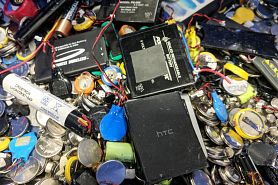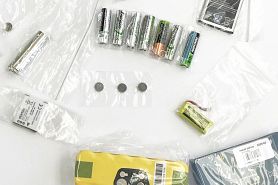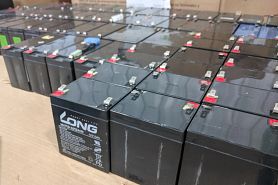PROPER HANDLING OF USED BATTERIES
Batteries used in many household and office products, as well as motor vehicle batteries, contain a variety of heavy metals and other materials that can be harmful to human health and the environment if not handled properly. Many of these materials can be recovered and reused by specialized recyclers.
The publication below provides a guide to managing different types of batteries.
- Household Battery Recycling Guide (WA-1621) [PDF]
- Guia de Reciclaje de Pilas Domésticas (WA-2007) [PDF]
For electronics that contain batteries, find an electronics collection site or mail-back program registered with E-Cycle Wisconsin.
Special requirements for non-household batteries
There are different requirements for batteries from households and batteries from businesses and other non-households. Many batteries, including lead-acid batteries, are regulated as universal (hazardous) waste when not generated by households. Visit Managing universal waste in Wisconsin for more information.
Dry cell batteries
Batteries used in homes, businesses and schools

Dry cell batteries are used in many products – including portable electronics, power tools, watches, calculators, hand-held vacuum cleaners, lawn care equipment, flashlights, toys and hearing aids. They come in many sizes and shapes and include both rechargeable and non-rechargeable battery types. They include alkaline, alkaline rechargeable, lithium, lithium-ion, metal hydride, mercuric oxide, nickel-cadmium, silver oxide and zinc-air batteries. They include AAA, AA, C, D, 9V, button, coin and other sizes, and may also be incorporated in products (such as cellphones and laptops).
You can reduce waste by buying rechargeable batteries when possible. When rechargeable batteries come to the end of their lifespan, they can be recycled.
Alkaline batteries may be put in the trash, but some battery retailers or other recycling locations may accept alkalines for recycling.
Environmental and safety impacts of dry cell batteries
The materials in many types of dry cell batteries – including mercury, lithium, cadmium, lead and acids – have the potential to be hazardous wastes. If these batteries are burned or landfilled, the heavy metals in them can be released into the environment.
Many batteries, particularly rechargeable lithium-ion batteries used in many electronics, have a significant risk of fire if they are mishandled or damaged. For that reason, it is important to handle used batteries properly.
Safe management of used batteries from households

While households are not required to recycle batteries, putting non-alkaline batteries in the trash or curbside recycling carts/bins can pose a risk to garbage collectors, recycling facilities, solid waste transfer stations and landfills because of the potential for the batteries to catch on fire, especially if damaged by equipment.
Wisconsin has banned many types of consumer electronics from landfill or incinerator disposal. These electronics can be recycled through E-Cycle Wisconsin.
If storing batteries for recycling, you can reduce fire risk by taping ends of batteries with clear packing tape or putting each battery in an individual plastic bag, and storing them in a non-metal, leakproof container with a lid (such as a plastic bucket).
Find battery recycling locations
Do NOT place batteries or electronics in curbside recycling carts or bins, because they may cause a fire if damaged by equipment in recycling trucks or facilities.
To find a drop-off location in your area for rechargeable or other batteries:
- Visit Call2Recycle [exit DNR] or call 1-877-2-RECYCLE; many retailers participate in this non-profit program to recycle rechargeable batteries and have collection boxes in their stores.
- For electronics that contain batteries, find an electronics collection site or mail-back program registered with E-Cycle Wisconsin.
- Contact your local recycling program to see if they offer collection.
- Visit the Wisconsin Recycling Markets Directory [exit DNR].
Requirements for managing batteries from non-households
Batteries generated by businesses, schools, institutions, governments and other non-households are subject to hazardous waste requirements, which allow for certain wastes to be managed under universal waste requirements. Alkaline batteries may be put in the trash, but others must be recycled or managed as universal waste. See the publications below for a guide to managing different battery types and a printable poster with collection and storage requirements and best management practices.
- Battery Recycling for Businesses (WA-1622) [PDF]
- How to Handle Universal Waste: Batteries (WA-1809) [PDF]
Requirements and safety procedures for battery collectors, transporters and recyclers
Battery collectors, transporters and recyclers must follow universal and hazardous waste requirements and U.S. Department of Transportation regulations for used batteries from both households and businesses/non-households. There are also several best management practices and products designed to prevent fires.
- Management of universal waste in Wisconsin
- U.S. DOT information on safe battery transportation requirements [exit DNR]
- U.S. DOT Lithium Battery Guide for Shippers [PDF]
- U.S. DOT Guide to Understanding the Risks of Damaged, Defective or Recalled Lithium Batteries [PDF]
- Call2Recycle battery safety information, training resources and battery fire suppression products [exit DNR]
Automotive (lead-acid) batteries
Batteries used in motor vehicles and engines
Lead-acid batteries, or "automotive type batteries," are found in cars, trucks, motorcycles, boats and vehicles and devices with internal combustion engines.

Chapter 287.07(1m), Wis. Stats., bans lead-acid batteries from landfill disposal and incineration at a solid waste incinerator. They can be collected for recycling or regeneration under hazardous and universal waste rules.
Storage, transport, collection, recycling and regeneration of lead-acid batteries is regulated under ch. NR 673 or subch. G of ch. NR 666, Wis. Adm. Code.
Safe handling of lead-acid batteries
When handling a used lead-acid battery, use rubber gloves and eye protection and always wash hands immediately after handling the battery. Acid from leaking batteries can burn the eyes and skin.
Store used batteries in a cool, dry, well-ventilated area on a leak-proof surface or in a leak-proof container to protect against exposure and ensure that acid and lead will not leak into soil or groundwater. Do not short circuit battery terminals or remove vent caps. If stored improperly, lead-acid batteries may leak or spill and cause lead and/or acid contamination of the soil and groundwater. If the battery is cracked or leaking, store and/or transport it in a sealed five-gallon plastic pail. Take the battery directly to a retailer/recycler to avoid long-term storage damage and leakage.
Retailer battery recycling program
Consumers may bring lead-acid batteries to any Wisconsin retailer that sells these batteries, during normal business hours, for recycling. This service is free to customers who purchase a new battery when they bring in a used one. Customers may be charged a fee of up to $3 if they bring in a used battery without purchasing a new one.
Retailers must charge a deposit of $10 on the sale of an automotive type replacement battery and must refund the deposit in monetary form (i.e., not a store credit) upon request if the customer returns to the same retailer, at any location owned or operated by the retailer, with a used battery. The retailer may require proof that the consumer purchased a battery from the retailer. This transaction is not a product return and is not subject to time limits on product returns.
The state recycling law requires battery retailers to post a sign stating "Recycle Automotive Batteries Here." The sign must be 8.5 x 11 inches and be visible to customers.
